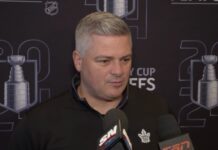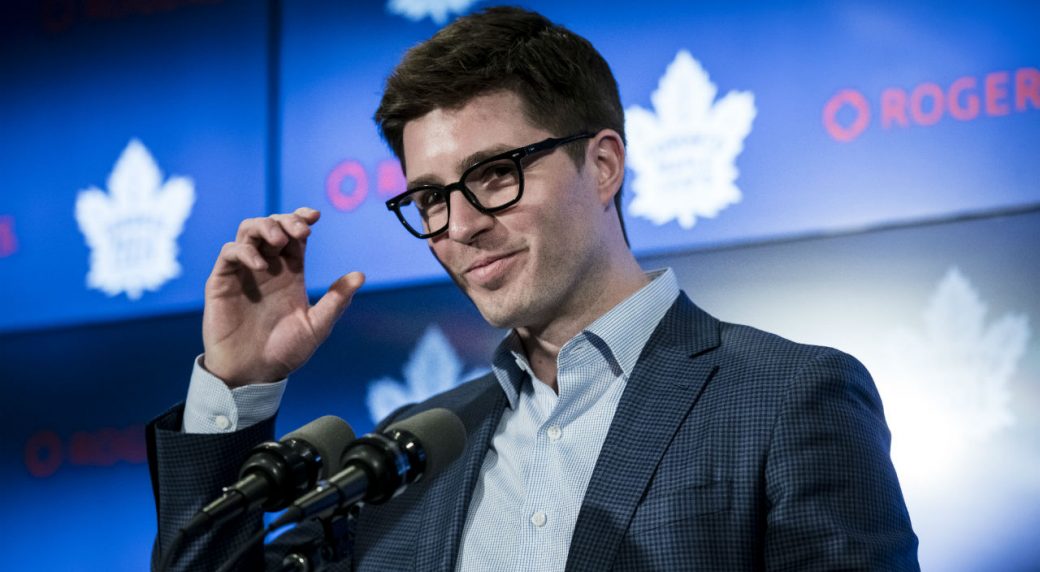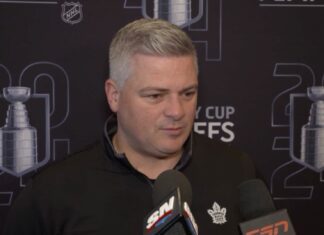Kyle Dubas joined Tim & Sid on Thursday evening to discuss getting Alex Kerfoot and Cody Ceci under contract, the latest on the Mitch Marner negotiations, the long-term plan on the blue line with two expiring contracts added in Cody Ceci and Tyson Barrie, and much more.
We’ve seen how tricky it can be to get RFA signings done in a timely fashion. Did you have a feeling you could get both of the deals you got done today done that quickly?
Dubas: I think as soon as we completed the trade we had discussions. Both players have the same agent, JP Barry, which certainly helps the process. Cody Ceci and Alex Kerfoot are both represented by JP. Brandon Pridham from our staff got in touch with him and there is a deadline coming up here in the next day or so for arbitration which both players were eligible for. We had just signed Johnsson and Kapanen, who both have similar profiles to Kerfoot. That provided a great framework for his.
Ceci — I just think there was a lot of common ground on what the deal would look like and we were able to quickly move past it. The credit has to go to Brandon Pridham on our staff and JP.
Did you ever envision yourself doing business with a team like Ottawa within the division, especially considering the unique geographical relationship and rivalry you guys have?
Dubas: I guess earlier I used to think that back when I was in the Soo in the OHL. Lou was the one who kind of drilled into my head the fact that it shouldn’t really matter. If you’re making a trade that is going to be good for both teams, both teams will benefit from it and it shouldn’t matter whether the team is your closest geographical rival or whether they are way on the west coast. You just try to make good moves for the team. There was the natural fit there for us so we just went ahead and did it. I don’t think there would be any opposition internally to dealing with Ottawa, Montreal, Buffalo, Boston, Tampa — anybody of that nature as long as they’re moves that we all feel can better our clubs.
Did you think about a longer-term deal for Ceci or does this give you the flexibility that you need?
Dubas: I think for both Cody and for us, the nature of the deal being one year, we get a chance to get to know him a little bit better at a key time in his career. He’ll turn 26 years old early in the Fall and we’ll have the chance to get to know him a little bit better and see how he can progress under Babs and Dave Hakstol and Paul McFarland with our staff. And then we’ll be able to make a long-term determination as we get through the season. I think this is probably the best case with where he is at in his career and where we are at as a team and the decisions we’re going to have to make moving ahead.
You’ve made it fairly important to let it be known how important it is know the final Marner number in terms of the rest of the offseason and what it would look like. Are you surprised how much business you’ve already done despite not knowing what Mitch’s final number is?
Dubas: Well, we’re pretty fortunate with our staff here. Brandon Pridham, in particular, does a great job of kind of always setting out each day and as we go into discussions for each transaction the number of dollars we have to protect for Mitch and just to make sure we don’t infringe upon that and put ourselves in a vulnerable spot in case something were to come along. There are so many different mechanisms within the CBA and how the cap is calculated within the offseason and long-term injury and various different machinations that go on there to tell you what your actual cap number is.
I’ve seen all different things today and people have asked us all day today — different teams and our media relations department gets questions about how much space we have — and it’s a really difficult thing to calculate unless you’ve got the really thorough knowledge of the CBA. We’re always protecting for what the contract for Mitch will be and also to ensure we aren’t vulnerable to other teams to try to swoop in with a potential offer sheet.
Do you want to just give us an official statement of where you’re at with Mitch Marner?
Dubas: Sure. We continue to have good dialogue daily with Mitch’s representative Darren Ferris. We continue to try to work hard towards it and try to get as creative as we possibly can to get it across the finish line. I think we’ve said repeatedly we are never going to change our stance on Mitch and the type of person he is. He is a joy to have around each day coming into the rink. He is obviously a star player in the league already. Those are the types of players you want to have as part of your program as long as possible.
We will just continue to work with Darren to make sure that remains the case. I’d be a little bit more anxious if more of the RFAs were starting to come off the board and we were still left without a solution. I know there were a couple that signed the other day, but it seems to be a situation throughout the league where there is a little bit of a standstill. We’ll keep working away. They’ve been very good in communicating with us daily and we’ll just try to push it along.
There was a report today that there might be an offer sheet coming for Mitch Marner. How seriously do you have to take that kind of stuff?
Dubas: I think we went into the offseason and we were always prepared that that was a possibility. There was one the other day with Montreal and Carolina. They’re perfectly permissible within the CBA and we are aware of it. We are aware of the threat and the different things that are happening with different teams. You kind of try to track where other teams are at to try to make sure you are in a good spot in case one comes. And then you have to make your decision based on whatever that may be if the offer sheet is in fact signed.
It is interesting that people say that someone is going to be given an offer sheet. Because they’re free agents, the discussions on the actual contract can be had with the player and his agent, so it would be an agreed upon negotiation on that side as well. If it happens, it happens. I think we are in a spot where we protected ourselves to make a really sound decision and not a defensive one, but as I said earlier, we are totally focused on continuing to work with Darren and with their camp to try to get this done.
If Mitch were to sign an offer sheet — which a player has to sign and agree to — would that damage the relationship regardless of whether or not you matched between you, Darren and Mitch?
Dubas: I don’t think so. For me, it is nothing personal. It is totally permissible within the collectively bargained rights of the players and the relationship and the rules between the Players Association and the league. We hope that that wouldn’t happen and we hoped we could find our own solution without having it come to that point, but Mitch is an excellent player and I am not surprised there would be people interested.
In terms of the personal feeling between our organization and Mitch, I don’t think there would be any real change. I think we all recognize his value as a person and a player to the Toronto Maple Leafs. That is why we are continuing to try to work on negotiating our own agreement. We’ll take everything as it comes and it’s the same from our end. I don’t think anything is personal with them, either. It is just trying to sort through this business relationship and carry on as we were.
What did you think about your friend Masai Ujiri saying the hockey team was going to win a championship soon?
Dubas: It was great. A couple of our players actually sent it to me as well. He is so passionate and genuine when he says everything. My belief is that he truly believes that or else he wouldn’t say it. I just think that is the type of person that he is.
With the Raptors, I know everything that they’ve gone through — first making the playoffs versus Brooklyn in 2014 and the ups and downs every season and losing to Cleveland — and it’s a long journey. I think our organization can learn so much from Masai and Bobby and the way that they’ve handled everything — the patience, the resiliency that is needed when it doesn’t work and everyone has sort of started to circle and criticize the plan and having the conviction to stick with it.
The one thing about Masai that usurps everything else about the way that he does business and the one thing that stands above is just his absolute belief that they were going to win and his absolute belief in their program. It’s something we’re continuing to build and it’s going to happen over time. I believe he will be proven right.
Masai’s roll of the dice played out pretty good. Depending on how the next couple of days turn out, it could turn out really, really, really good. You’ve got a couple of defensemen whose contracts are up next season. Did some of that kind of roll of the dice rub off on your decisions?
Dubas: I would love to say yes and that we’re following the exact same model and hoping for the same result. We added Muzzin during this last season and we knew he was going to be up. Now we’ve of course got Ceci and Barrie. The way we look at it is that that is a really solid chunk of cap space and we’ll evaluate those players as they go through the season and get to know them better. We’ve had Muzzin for about half a year and we can evaluate where he is at and what we want to do with all three of those players. We’ll certainly have the cap space to engage with them.
One of the strengths of our prospect system is the defensemen that we have coming on the way as well. We look at this year as a way for us to take the season, see how our own players develop internally, and then be able to make a really sound decision at the end of the year as to what we want to do re-signing the free agents we have on our roster and how a player like Travis Dermott continues to progress once he gets back from injury in December/January and how our prospects like Timothy Liljegren and Rasmus Sandin continue to develop as well and see where they are going to fit in amongst the rest.
We just thought, in playing it out and mapping it out for the year, this would give us the best way to make a well-rounded decision. We’re building a program where players want to come here and want to stay here, especially as we continue to move towards our ultimate goal of contending year in and year out. It is never optimal to have that many players expiring all at the same time, but we felt that with the confluence of all of those things happening, it would set us up very well for next summer.
What were you thinking while you saw at a minimum two million people in the streets of Toronto during the Raptors parade?
Dubas: It was amazing. I know throughout the Leafs side and the Leafs segment of our organization, knowing a lot of the people who cross over and do a lot of the work between the Leafs and the Raptors… It was amazing. You don’t ever want to get too far ahead of yourself. I know people come out with the parade jokes every time you even talk about contending and winning, but I think you have to when you are in an endeavour like this… You guys know how much work goes into your craft. When you are in sports, it is a lot of hours and a lot of fun. You are all working towards that exact moment and you are working towards that time when it all finally comes together and the bounces go your way and you stay healthy and the team all comes together perfectly.
You celebrate a moment like that and you see the impact it could have — the Raptors were more nationwide, but certainly, within the city. I think if we were ever lucky enough to get to that point one day, the impact it would have on the city and the community… I know we are all well paid to do what we do, but it really makes you grateful for the opportunity to work in sports and have the type of impact the Raptors have had on the community if you could push it through one day.




![Sheldon Keefe Post Game, Leafs 3 vs. Bruins 2: “I loved [the Matthews] line, and I loved a lot about our game all the way through the lineup” Sheldon Keefe, Toronto Maple Leafs post game](https://mapleleafshotstove.com/wp-content/uploads/2024/04/keefe-pg-game-1-218x150.jpg)


























![Sheldon Keefe Post Game, Leafs 3 vs. Bruins 2: “I loved [the Matthews] line, and I loved a lot about our game all the way through the lineup” Sheldon Keefe, Toronto Maple Leafs post game](https://mapleleafshotstove.com/wp-content/uploads/2024/04/keefe-pg-game-1-100x70.jpg)



